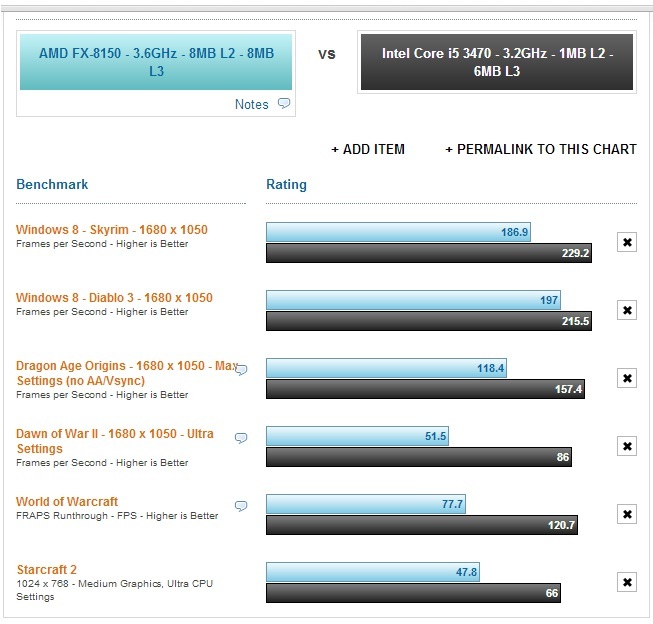Isn't Moores Law about transistor (complexity) density on a integrated circuit rather than performance? So far this has not been broken and it seems that it won't be in the near future - there might be a problem with very small structures but I guess Intel already has a plan for their Fabs.
You are right.
But I think it's meaningless for the consumer when it doesn't translate into more performance.
Nvidia went for small dies and a relatively narrow bus , intel did the same (smaller die).
You'd expect prices to go down accordingly but nope.
The consumer only bears the consequences when costs go up (usual pity party), not when they go down.
Lol, your post is wrong on so many levels. RAM latencies are pretty much a myth (they really aren't going up), GPU speed increases are at about what is to be expected considering that the power usage can't increase by much anymore and your performance/dollar claim is - no offense - ridiculous.
A HD4870/1GB was about 250€ in the fourth quarter of 2008. Today HD7870/2GB is 200€.
That's like a performance increase of sth. like 150% at less power consumption, a lower price and more features. HDDs are a very, very special case, still partly influenced by the Thailand flood. See SSD prices for comparison.
You might wanna give a source to that AMD rep thing. Afaik it's just a rumour and one that honestly makes no sense. You don't say sth. like that publicly.
I bought my hd 4870 for 130 euros in Q1 2009. (not on a sale, no promotion, median price.
6 months ago (Q3 2012) the 7870 was still 350 euros. Nearly 3x the price for less than 3x the performance. In fact the hd4770 kept topping the performance/dollar graphs on benchmark sites that keep track of these things until the AMD price drop from a few months back. (congratulations, you can now get a bit more performance for your buck than you could 4 years ago, all hail the corporate overlords in all their benevolence).
Hence why I said barely, performance / dollar was lower before the price drops, now it has finally improved a bit from 3.5 years ago (market has spoken).
Ram latencies a myth? ok then.... whatever you say. In fact it was the much improved clockspeeds that canceled out the higher cas latency, there was no performance benifit (not in synthetic benchmarks either) for going from ddr2 to ddr3 until the lower cas high clockspeed 32/28nm sticks were out.
You have no idea what you are talking about with the power consumption comment, power consumption WAS about as high as it could get with the gtx 580/hd6970 yes, at a ridiculous 300W.
A gtx 670 is a 150W card (gtx 680 170 W), because (as I already mentioned) they are mid range sized dies branded as high end parts.
GTX 580 = 520mm^2 huge die --> 300W card pushing the limits of what you can cool in a 2 slot sized gpu.
GTX 680 = 295mm^2 midrange sized die --> 170 watt card that can be cooled on air at low rpm to not be louder than your case of PSU fans. (sauce for power consumption:
http://www.guru3d.com/articles_pages/geforce_gtx_680_review,9.html )
Hell the gtx 260 had a 450mm^2 die and consumed 180W of power many many years ago, so yes... gtx 580 was at the limit of power draw, gtx 670 and 680 aren't even close.
Personally I'm relieved that the current cards have more reasonable die sizes and power consumption, nvidia and amd clocked and volted those large dies to unreasonable levels to eek some more performance out of their cards because they were stuck at 40-45nm for 3 generations)
Too bad the prices aren't appropritate... Gtx 680 should never have cost more than 250 euros.
They should still have released gk110 , now all the poor sods with 1440p monitors or 120 hz monitors end up having to deal with SLI shenanigans and driver problems because they are forced to buy 2 midrange gpus to get the performance they want.
I admit I could be wrong on the CES thing, I should have left that out since there is no real way to confirm it.
Everything else I said still stands.

